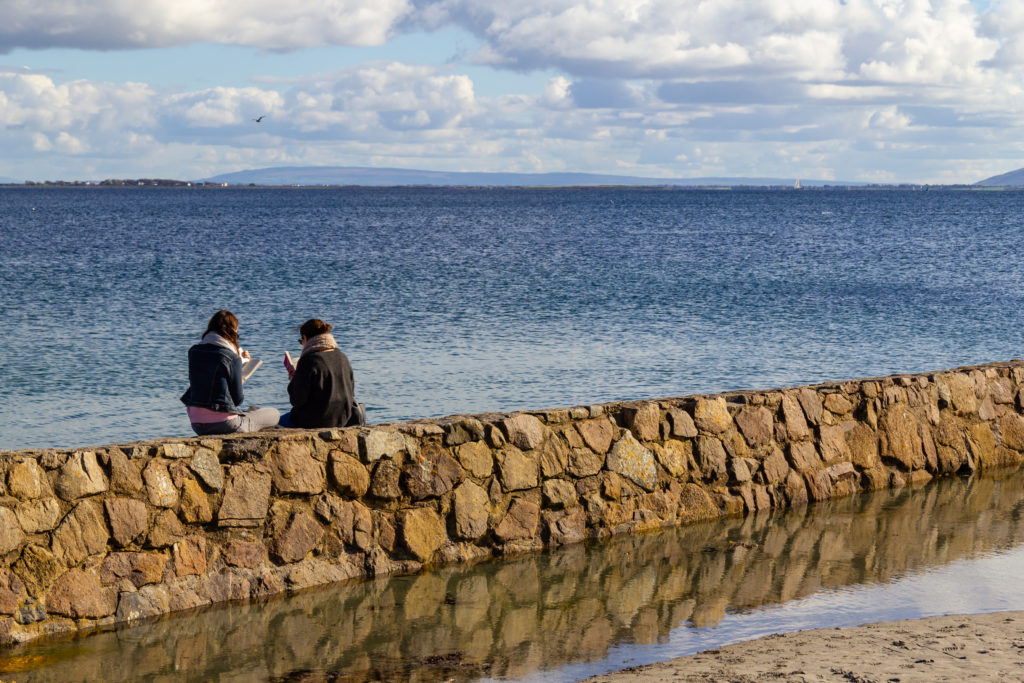Last summer I stayed for two months in an Irish village.
People often pleasantly inquired, “Are you on holiday?” or “So you’re vacationing?”
“No!” I’d practically shout in reply. “I am not on vacation. I am working.”
“Oh. Okay,” I could almost hear them thinking, “Because we see you peering into shop windows, eating pastries from the fancy greengrocer, browsing the used bookstore, yakking on your phone, ambling down the Bog Road taking pictures of sheep, incessantly ducking into church… I’m sorry. We thought that signified a holiday.”
To be fair, as a writer, in a way, you are always working. Pondering, making mental connections, observing, mining reality, composing sentences, paragraphs, and stories in your head.
In another way, let’s face it — writing is hardly digging ditches, driving a cab or raising children.
The point, though, isn’t to split hairs over which kind of work demands more. The point may be a question raised by philosopher Zena Hitz in a recent “Plough” essay: “What Is Time For?”
Specifically, Hitz asks, “What is leisure, and why is it necessary for human beings? The leisure that I am interested in is not the first thing you may imagine: binging Netflix on the couch, lounging at the beach, attending a festive party with friends, or launching yourself from the largest human catapult for the thrill of it. The leisure that is necessary for human beings is not just a break from real life, a place where we rest and restore ourselves in order to go back to work. What we are after is a state that looks like the culmination of a life.”
Sixteen hundred years ago, Hitz points out, Augustine and his mentor, Bishop (now St.) Ambrose were both busy, busy, busy: students to teach, letters to answer, news to catch up on, religious duties.
In his few moments of snatched time, Ambrose would sit, even in the midst of a boisterous crowd, envelop himself in a kind of invisible cloister, and silently read.
Boy, could I relate. From my earliest memories, my fondest wish has been to be left alone so I can go off in a corner, or under a tree, or find a bench at the farthest end of the train, bus, or orchard, and open a book.
I’m not the first to notice that the parable of Martha and Mary represents our own split psyche. One part just wants to read or look at the birds or sit at the feet of Jesus and drink in his every word. The other part is scolding, “Wash the bathroom floor!” and “You need to make a dentist appointment!” and “What about your taxes!”
Jesus had administrative duties, too. He seems not to have sweated them (nor ever to have worried that there wouldn’t be enough money).
As Psalm 127 runs:
“In vain is your earlier rising,
your going later to rest,
you who toil for the bread you eat:
When he pours gifts for his beloved while they slumber.”
On the other hand, we all want to be able to say, like St. Paul, “I have stayed the course; I have finished the race.” Jesus himself clearly stretched himself to the limit of his physical, emotional, and spiritual strength as he walked through the countryside healing and casting out demons.
But the issue isn’t so much work versus workaholism as how we choose to use our “free” time.
As Hitz points out, “Ambrose has more work than anybody, but he knows how to use his breaks.
His leisure shows us what he cares about most; it shows both why his work matters and why it doesn’t matter.”
Part of the reason I’m so attached to being seen as a hard worker is that I forever toil in the psychic shadow of my working-class parents.
But after reading Hitz’s piece, I see I’m also fiercely protective, as I should be, of my “leisure.”
We flee leisure because we flee our own emptiness, Hitz observes. Leisure is in fact an interior discipline that requires significant sacrifice: of money possibly; of stature recognition, a robust social life. So to pursue it, to insist upon it, is a pearl of great price.
What is our highest good? Hitz invites us to ask. What does contemplative leisure look like in real life?
She gives several examples: loving relationships, study, intellectual reading; prisoners under totalitarian regimes who wrote poems on cigarette papers or scratched into bars of soap and passed them on to their neighbors. Prayerful solitude.
Activities, in other words, that don’t reduce us to units of efficiency, that can’t be co-opted for someone else’s production quotas.
“Let’s pause and ask ourselves,” she continues: “What parts of our lives seem to be the culminating parts, the days or hours or minutes where we are living life most fully? When do you stop counting the time and become entirely present to what you are doing? What sorts of activities are you engaged in when this takes place?”
Well, let’s see. Wandering down the Bog Road taking pictures of sheep. Eating an almond croissant, with gratitude for every bite. Chatting with dear friends. Buying (more) books to read. Ducking into church to pray.
“Are you on holiday?” Yes. All the time. Absolutely.

